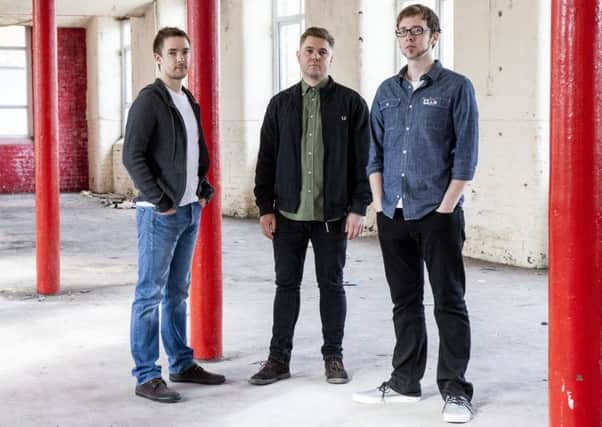GoGo Penguin's Man Made Objects head to Turner Sims


With their unique blend of jazz and electronica-influenced sound, all played live on drums, bass and piano, the three-piece had been busy winning fans and rave reviews wherever they play.
It was a gig at the Uber Jazz festival in Hamburg that swung the deal for them.
Advertisement
Hide AdAdvertisement
Hide AdBassist Nick Blacka explains: ‘It’s amazing, it’s such an iconic jazz label, we didn’t really see it coming.
‘We were with Gondwana, a small label in Manchester and we were just going to do the next album with those guys, we weren’t fishing around for a new deal.
‘But then they came to a gig in Hamburg, Don Was, the head of Blue Note in LA and Nicholas Pflug, he’s the head of Blue Note France, they both came out and we chatted with us after the gig and had a beer and stuff – the next week they offered us the deal.
‘We didn’t really see much benefit to it beforehand, other than being able to say: “We’re on Blue Note”, but once it came out we could see what they could do for us – the kind of audience reach they have, a lot of new people have discovered us on this album.’
Advertisement
Hide AdAdvertisement
Hide AdBut Blacka admits, he wasn’t too familiar with his new label boss at the time. Don Was led the band Was (Not Was) and has produced dozens of hit albums by acts from The Rolling Stones to Iggy Pop and Garth Brooks.
‘I didn’t really know who he was, he’s quite a unique looking character. He’s just really cool, you could tell he’s a musician and really into it.’
Inspired by robotics and human augmentation, the new album takes the band’s themes further than before. And they have been able to play in America for the first time too.
‘America was very interesting for us, we didn’t really know what to expect. At the beginning of last year we played at Winter Jazzfest in New York, which is like a big jazz showcase event, and we thought they might not like us at all– we’re going to the home of jazz, and we’re kind of jazz but not jazz, but we got some great reviews. The Wall Street Journal seemed to really understand us and get on board with what we’re doing.’
‘We thought we may get completely rejected as some fad.
Advertisement
Hide AdAdvertisement
Hide Ad‘We get asked a lot whether we’re part of a scene or anything, and it’s difficult to know. When we started the band we were just making this music because it’s the sort of music we wanted to hear and we’re interested in.
‘When you get to this level where you see other people doing a similar sort of thing, it feels like there’s this resurgence, it’s not been a conscious thing. The Kendrick Lamar thing, and the fact that Kamasi (Washington – jazz’s new sax superstar) played on that and now he’s doing more straight ahead jazz, is definitely going to help, and the whole (influential record label) Brainfeeder thing, that Flying Lotus comes from – if you’re 15, 16 now and all these bands are around, it’s going to make you think jazz is all right, it’s not old people music.
‘The problem with jazz is that it encompasses so much, – to one person it might mean a Dixieland band with the clarinet, or old guys playing swing in a working men’s club, all the way through to someone like Ornette Coleman.
‘That’s why “jazz” is a bit of a dangerous word in a way, it has all these different connotations.’
Advertisement
Hide AdAdvertisement
Hide AdThe trio have also recently released a new EP, Live at Abbey Road, which includes an extract of the new score they did for the cult classic Koyaanisqatsi. The trio were invited to the project by the Manchester arts venue, HOME.
The original score was done by composer Philip Glass.
‘We went with a completely different approach to the original, there’s not much point in redoing it.
‘HOME wanted to ask some local acts if they wanted to do a rescore to a silent film, or put music to a silent film, that was the brief, it wasn’t specifically that film.
‘Koyaanisqatsi is such an iconic film and (GoGo’s drummer) Rob has always liked the idea of it, so we asked Katy, who was organising it, wouldn’t it be great to do something like Koyaanisqatsi? And somehow she got permission. She came back to us saying, I hope you were serious about doing Koyaanisqatsi...
Advertisement
Hide AdAdvertisement
Hide Ad‘We did an entirely different take on it. My take on the Philip Glass score is that it’s impartial, and maybe we brought some emotion to certain scenes, rightly or wrongly.
‘Some people got really angry about it on Facebook, going: “You can’t do this, you can’t do Koyaanisqatsi without Philip Glass, they’re inseparable!” And it was: “Well, they’re not, and we can!”’
Turner Sims, Southampton
Thursday, November 3